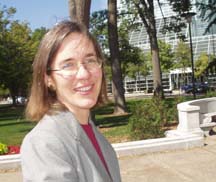2006.11.08: November 8, 2006: Headlines: Figures: COS - Cameroon: Journalism: Speaking Out: Election2006: Freedom of Speech: The Capital Times: Margaret Krome writes: System needs a free media, uncowed opposition to work
Peace Corps Online:
Directory:
Cameroon:
Special Reports: Cameroon RPCV and Columnist Margaret Krome:
2006.11.08: November 8, 2006: Headlines: Figures: COS - Cameroon: Journalism: Speaking Out: Election2006: Freedom of Speech: The Capital Times: Margaret Krome writes: System needs a free media, uncowed opposition to work
Margaret Krome writes: System needs a free media, uncowed opposition to work

"I have comforted myself for the past several years with the certainty that extreme polemic can only go so far. Eventually, badly conceived policies yield bad fruit; badly executed responsibilities result in tragedies, badly appointed top brass botch their jobs. And when it happens, if an electorate can to abandon its partisanship, those leaders will fail. But in the meantime a lot of people will have been hurt. To shorten the inevitable public disaffection with badly conceived policies, there must be a genuine loyal opposition in Congress, and recommitment to a reinvigorated, independent and diverse media, including increased local control over programming, more diverse and local ownership, and, for broadcast media, accountability for use of the public airwaves. " Journalist Margaret Krome served as a Peace Corps Volunteer in Cameroon.
Margaret Krome writes: System needs a free media, uncowed opposition to work
Margaret Krome: System needs a free media, uncowed opposition to work
By Margaret Krome, Nov. 8, 2006
As I write on Election Day, nobody knows what news Wednesday morning will bring, other than undetermined gains for Democrats in Congress. Political analysts will debate in coming weeks how many shades of blue and red there are and what they mean.
For me, Election Day offers time to ponder the issue expected to be responsible for more electoral change than any other. The souring of the public mood about the war in Iraq raises questions about the critical roles of an independent media and a vigorous loyal opposition.
All polls suggest that the public is disillusioned with the war in Iraq. The Program on International Policy Attitudes/Knowledge Networks poll says that, going in to the election, large majorities of Americans say they want their member of Congress to work to shift the emphasis of U.S. foreign policy in favor of diplomacy, multilateral cooperation, and homeland security.
The nation that accepted the war as a means of protecting the nation, then accepted it as a means to liberate another struggling nation, then accepted it to create a democratic beachhead in the Middle East, and finally accepted it because we were there and need to support our troops, is finally rejecting it. Jingoism that whipped up public support is yielding to the reality of this war's terrible price and its utter failure to accomplish any of its goals.
Have we learned anything from these destructive years of war policy? Would the public not jump right back into supporting "our team" the next time a president and Congress bamboozles the press into supporting a climate of unswerving patriotism for a badly conceived war? I wonder if the public could agree on clear criteria for support of a war, such as :
• That it is necessary to achieve a clear and worthy goal.
• That all other means diplomacy, economic sanctions, international censure, trade have been exhausted before proposing war.
• That the goal is actually achievable.
• That the system for awarding war contracts keeps those decisions scrupulously separated from partisan politics.
But I have to wonder if we can ever be immune to war demagoguery.
It's not as though nobody spoke up as the gears of the Iraq war machine began turning four years ago. There were demonstrations around the nation and critics challenging the motives and facts of the Bush administration. Many argued that the war could gravely compromise our nation's security, and endanger our troops and harm Iraqi civilians for no cause.
The problem wasn't that these arguments never got stated, but that the major media brokers aggressively stifled them, allowing demagogues to demonize reasonable critics. With eight corporations controlling the majority of our nation's news, entertainment and information, true debate could not occur.
Similarly, with both houses of Congress controlled by the same party as the president, there was no meaningful chance for resistance. Democrats became cornered and afraid of being labeled weak on security.
Perhaps this election will prove to be one of the big electoral swings that happen from time to time. If so, its value should be judged partly by whether it ends a period that has come close to stifling true debate and democratic decision-making.
I have comforted myself for the past several years with the certainty that extreme polemic can only go so far. Eventually, badly conceived policies yield bad fruit; badly executed responsibilities result in tragedies, badly appointed top brass botch their jobs. And when it happens, if an electorate can to abandon its partisanship, those leaders will fail.
But in the meantime a lot of people will have been hurt. To shorten the inevitable public disaffection with badly conceived policies, there must be a genuine loyal opposition in Congress, and recommitment to a reinvigorated, independent and diverse media, including increased local control over programming, more diverse and local ownership, and, for broadcast media, accountability for use of the public airwaves.
Margaret Krome is a Madison resident who writes this column every other week. E-mail: mkrome@inxpress.net
Published: November 8, 2006
Links to Related Topics (Tags):
Headlines: November, 2006; RPCV Margaret Krome (Cameroon); COS - Cameroon; Journalism; Speaking Out; Wisconsin
When this story was posted in November 2006, this was on the front page of PCOL:





Peace Corps Online The Independent News Forum serving Returned Peace Corps Volunteers
 | Harris Wofford to speak at "PC History" series
Senator Harris Wofford will be the speaker at the 4th Annual "Peace Corps History" series on November 16 sponsored by the University of Maryland at Baltimore County (UMBC) and the Maryland Returned Volunteers. Previous speakers in the series have included Jack Vaughn (Second Director of the Peace Corps), Scott Stossel (Biographer of Sargent Shriver), and C. Payne Lucas (President Emeritus of Africare). Details on the time and location of the event are available here. |
 | Chris Dodd's Vision for the Peace Corps
Senator Chris Dodd (RPCV Dominican Republic) spoke at the ceremony for this year's Shriver Award and elaborated on issues he raised at Ron Tschetter's hearings. Dodd plans to introduce legislation that may include: setting aside a portion of Peace Corps' budget as seed money for demonstration projects and third goal activities (after adjusting the annual budget upward to accommodate the added expense), more volunteer input into Peace Corps operations, removing medical, healthcare and tax impediments that discourage older volunteers, providing more transparency in the medical screening and appeals process, a more comprehensive health safety net for recently-returned volunteers, and authorizing volunteers to accept, under certain circumstances, private donations to support their development projects. He plans to circulate draft legislation for review to members of the Peace Corps community and welcomes RPCV comments. |
 | He served with honor
One year ago, Staff Sgt. Robert J. Paul (RPCV Kenya) carried on an ongoing dialog on this website on the military and the peace corps and his role as a member of a Civil Affairs Team in Iraq and Afghanistan. We have just received a report that Sargeant Paul has been killed by a car bomb in Kabul. Words cannot express our feeling of loss for this tremendous injury to the entire RPCV community. Most of us didn't know him personally but we knew him from his words. Our thoughts go out to his family and friends. He was one of ours and he served with honor. |
 | Peace Corps' Screening and Medical Clearance
The purpose of Peace Corps' screening and medical clearance process is to ensure safe accommodation for applicants and minimize undue risk exposure for volunteers to allow PCVS to complete their service without compromising their entry health status. To further these goals, PCOL has obtained a copy of the Peace Corps Screening Guidelines Manual through the Freedom of Information Act (FOIA) and has posted it in the "Peace Corps Library." Applicants and Medical Professionals (especially those who have already served as volunteers) are urged to review the guidelines and leave their comments and suggestions. Then read the story of one RPCV's journey through medical screening and his suggestions for changes to the process. |
 | The Peace Corps is "fashionable" again
The LA Times says that "the Peace Corps is booming again and "It's hard to know exactly what's behind the resurgence." PCOL Comment: Since the founding of the Peace Corps 45 years ago, Americans have answered Kennedy's call: "Ask not what your country can do for you--ask what you can do for your country. My fellow citizens of the world: ask not what America will do for you, but what together we can do for the freedom of man." Over 182,000 have served. Another 200,000 have applied and been unable to serve because of lack of Congressional funding. The Peace Corps has never gone out of fashion. It's Congress that hasn't been keeping pace. |
 | PCOL readership increases 100%
Monthly readership on "Peace Corps Online" has increased in the past twelve months to 350,000 visitors - over eleven thousand every day - a 100% increase since this time last year. Thanks again, RPCVs and Friends of the Peace Corps, for making PCOL your source of information for the Peace Corps community. And thanks for supporting the Peace Corps Library and History of the Peace Corps. Stay tuned, the best is yet to come. |
 | History of the Peace Corps
PCOL is proud to announce that Phase One of the "History of the Peace Corps" is now available online. This installment includes over 5,000 pages of primary source documents from the archives of the Peace Corps including every issue of "Peace Corps News," "Peace Corps Times," "Peace Corps Volunteer," "Action Update," and every annual report of the Peace Corps to Congress since 1961. "Ask Not" is an ongoing project. Read how you can help. |
Read the stories and leave your comments.

Some postings on Peace Corps Online are provided to the individual members of this group without permission of the copyright owner for the non-profit purposes of criticism, comment, education, scholarship, and research under the "Fair Use" provisions of U.S. Government copyright laws and they may not be distributed further without permission of the copyright owner. Peace Corps Online does not vouch for the accuracy of the content of the postings, which is the sole responsibility of the copyright holder.
Story Source: The Capital Times
This story has been posted in the following forums: : Headlines; Figures; COS - Cameroon; Journalism; Speaking Out; Election2006; Freedom of Speech
PCOL35127
13

















